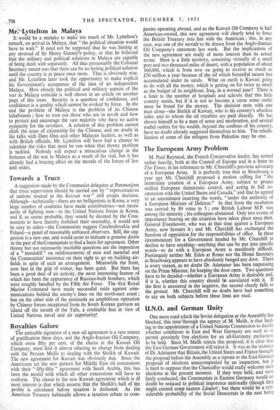The European Army'Problem
M. Paul Reynaud, the French Conservative leader, has scored rather heavily, both at the Council of Europe and in a letter to The Times, in his references to Mr. Churchill's previous advocacy of a European Army. It is perfectly true that at Strasbourg a year ago Mr. Churchill proposed a motion calling for "the immediate creation of a European Army, subject to proper unified European democratic control, and acting in full co- operation with the United States and Canada," and that he agreed to an amendment inserting the words, "under the authority of a European Minister of Defence." In that form the resolution was carried by 89 votes to 5; one British Labour M.P. was among the minority ; his colleagues abstained. Only two events of importance bearing on the situation have taken place since then. General Eisenhower, who was at that time against a European Army, now favours it ; and Mr. Churchill has exchanged the freedom of opposition for the responsibilities of office.. In these circumstances for a Government headed by Mr. Churchill to decline to have anything—anything that can be put into. specific words—to do with a European Army is manifestly difficult. Fortunately neither Mr. Eden at Rome nor the Home Secretary at Strasbourg appears to have absolutely banged any door. There is every reason, as no doubt Dr. Adenauer has been impressing on the Prime Minister, for keeping the door open. Two questions have to be decided—whether a European Army is desirable and, if it is, whether this country should be associated with it. If the first is answered in the negative, the second clearly falls to the ground. Mr. Churchill will no doubt have had something to say on both subjects before these lines are read.


















































 Previous page
Previous page